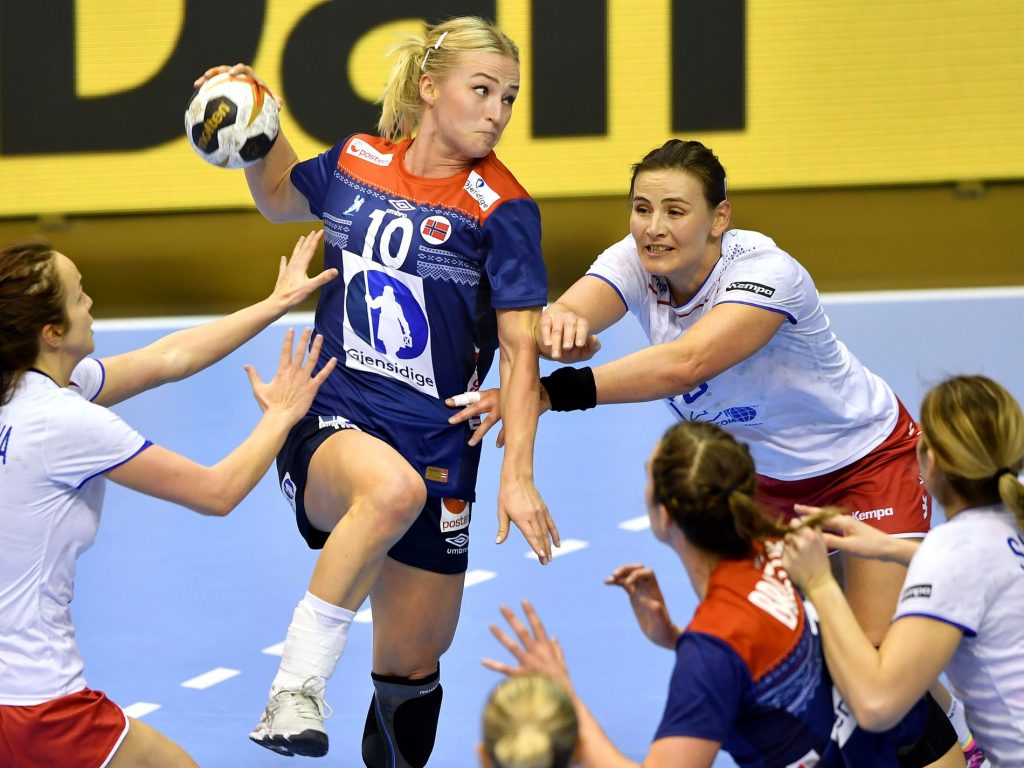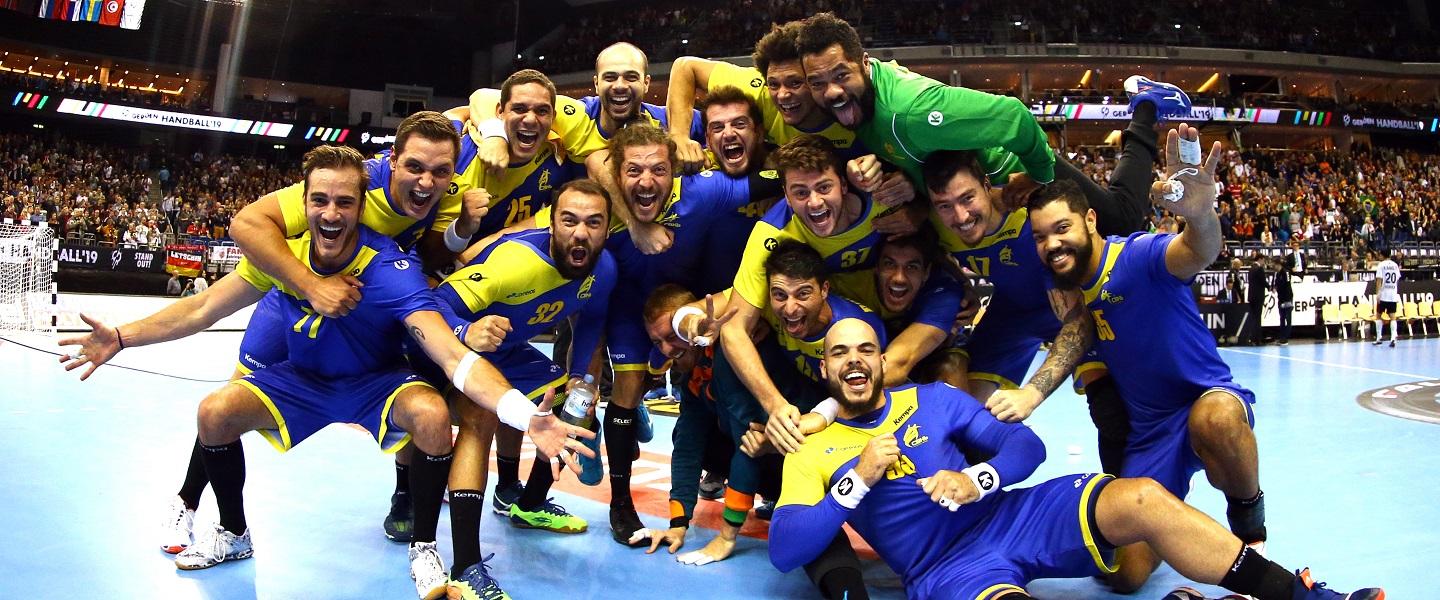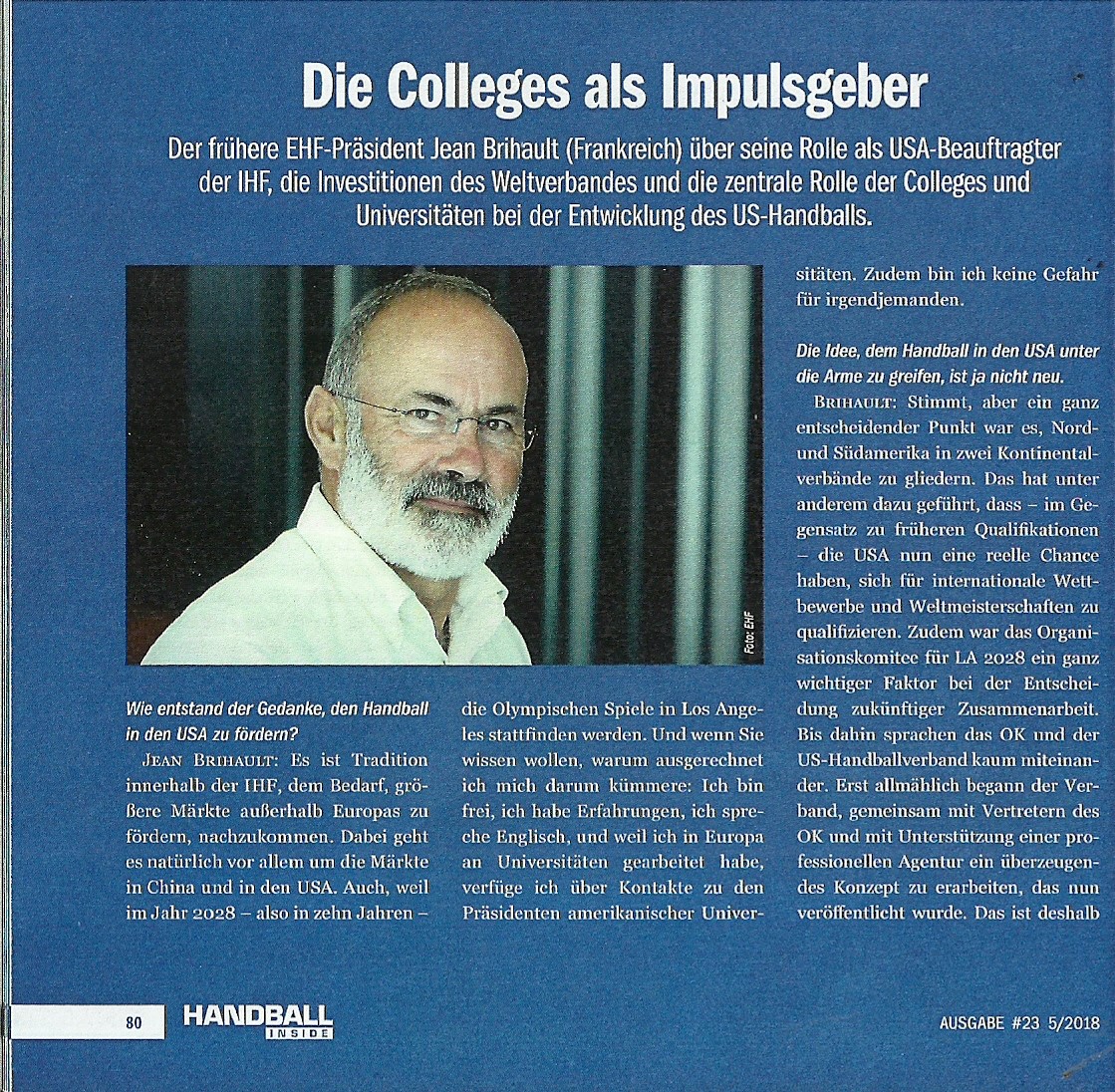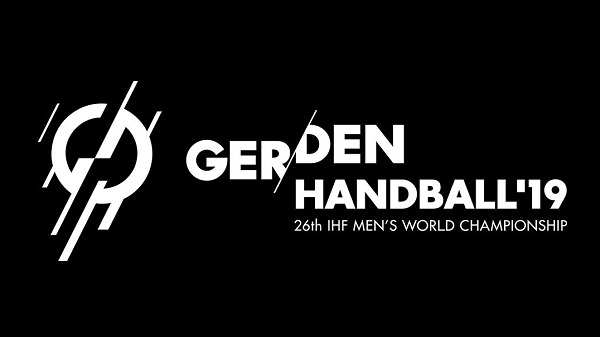
The German Handball Magazine, Handball Inside, reports on efforts to develop handball in the U.S. Below is a translation of the article, courtesy of Christa Ingram.
Utopia des Handballs
By Erik Eggers
The World Handball Federation and European Top Clubs are working on a vision to make Handball popular in the USA, in order to unlock the most important market in the world. How thick this board is, shows a look at the many futile attempts in the past.
The two Handball spheres Rene Christian Ingram moves between could not be more different. In everyday life the 19-year-old tends goal at TV 1861 Erlangen-Bruck II, National League North. His opponents are TV Helmbrechts, TG Beidingsfeld or ASV 1863 Cham. In between, Ingram, who studies mechatronic in the third semester at the University of Erlangen takes off for a completely different world. He boards a plane to the United States and slips on a US national team jersey: Hardly noticed in the province of this country this teenager is considered a promise for the future of international handball there.
In early September Ingram with some major saves in goal helped to advance the development of US handball to another important stage. In the knockout games against Canada for the Pan American Championship qualification 2019, a 36:24 home win in Auburn, Alabama, and in a 27-27 away rematch in Montreal, Quebec he was one of the strongest players on his team and was named MVG, Most Valuable Goalkeeper. “That was cool,” says Ingram in an interview with HANDBALL inside, in the two games against Canada, the team has shown “enormous development”. Ingram now, just like his captain, Ian Hüter, who usually wears the jersey of TSV Dormagen, is looking forward to a longer excursion, the continental championships (PANAM Games) in July 2019, in Lima, Peru. There the team, according to the wish of USA Team Handball CEO Mike Cavanaugh, will need to take at least third place in order to still have an chance to qualify for the Tokyo 2020 Olympic Games. As will, the women, who also prevailed in the playoff against Canada.
“It is eight years ago now since we last qualified for the PANAM Games,” says Cavanaugh, “this is great for the athletes, coaches and USA team Handball. We want to send the signal now that we have the intention to stand on the podium in Lima.” For a long time what happened in the USA was not on the radar of the handball scene.
But, now that the 2028 Olympics will take place in Los Angeles a large-scale attempt has been started to establish handball in one of the most important sports markets in the world. “It’s one of the most important projects to develop handball there in the next few years,” Hassan Moustafa, president of the International Handball Federation (IHF) says. “There are a lot of ideas and concepts from people who think about it” says Gerd Butzeck, CEO of Forum Club Handball (FCH) which also supports the new initiative.
How valuable it would be to popularize handball in the US is obvious. In order to economize the sport and not endanger the Olympic status further globalization is urgently needed. In core markets like the USA, China and India, which accounts for more than a third of the world’s population, handball only plays a marginal role to date. That is, of course, not new knowledge. The many attempts to establish handball in the USA have been a grand failure so far.
As early as 1931, a German gymnast named Ernst Lange, had founded a Handball department, the “German Sports Club New York.” The “spread of handball in New York” is only the beginning, Lange said at the time. The final aspirational goal would be “in the broadest sense to spread the game to 56 colleges and universities in the United States. The future will show whether such a plan is feasible.” At the field handball tournament of the 1936 Olympic Games in Berlin a US selection actually started. Most players had German surnames such as Hemy and Otto Oehler or William Ahlemeyer and were of German descent. They all played at the German Sport Club Brooklyn and in the German-American AC Queens, the two clubs in New York. But, Langes’s idea to popularize the game by spreading it at US universities and colleges, could not be realized.
At the beginning of the 1960’s a new euphoria prevailed. There could be “no doubt that the handball game also had a promising and successful care center in America,” cheered Siegfried Perrey, right hand man of Willi Daume. (Perrey and Daume were both active in German handball and Olympic organization) “Indoor court games become increasingly popular” Perrey reported “there is already a championship round with four Canadian and US teams each, plus a “League of ten” in New York.
“The new sport has also caught the attention of the business people,” Perrey cheered: “In Canada, television is broadcasting big indoor handball games case-by-case. This has called the promoters on scene in America. They smell that Handball is a big business. Right now is already the time that the clubs themselves risk venturing into the public on their own and thwart the plans of the professional managers. Perry speculated about a handball tournament in Madison Square Garden, the most famous indoor area in the world.
Many officials, including the IHF at that time, put their hopes in Avery Brundage, the then president of the International Olympic Committee (IOC). Since Brundage was very fond of anything German, one considered him as a friend of the handball. But when the IOC in June 1961, voted against the inclusion of Handball for the 1964 Olympic Games in Tokyo, most IOC members from North and South America argued that they did not know that sport.
With this background, Dr. Peter Buehning proceeded with the founding of the US Handball Association and in 1962 the US was formally added as an official member of the IHF. Buehning, a German-born entrepreneur, developed numerous initiatives during his tenure as President of the US Association to make Handball better known in North America. One idea was to convert Europeans who studied or worked in the USA to US national team players. At the Field Handball World Cup 1963 in Switzerland a US team with some German and Swiss nationals participated. One year later in Czechoslovakia, the USA took part for the first time in an indoor world championship. At both tournaments the president of the Association, Buehning, acted as captain of the Team and the Press spokeswoman was Buehning’s wife Renate. Hans-Jürgen Hinrichs, President of the German Handball Federation (DHB) between 1989 and 1993, reported how Buehning recruited new players for his project at the time. Before he started his career at the USA Volkswagen group Hinrichs had played with the DHB selection at the World Championships. “Completely unexpected” he got an invitation for USA national team training from Buehning. “I joined in and met a nice bunch, most of them from European descent.”
That’s the curious way Hinrichs got into the US selection for the World Cup 1964. “Buehning simply had, without asking me, requested a waiver for me and Fritz Hatting from the International Handball Federation” Hinrichs recounted. Hattig who studied at Stanford had previously played for the West-German club TuS Wellinghofen. Vincent Drake, the African-American star of the team, who stunned the opponents with his “windmill technique” had previously been a professional basketball player.
But, the World Cup participation didn’t really help to advance handball in New York, Chicago or San Francisco. That is why Buehning invented a new plan in the summer of 1969 and met at the height of the Vietnam War with four-star General William Westmoreland, the supreme commander of the US forces in Vietnam. One of them, Buehning, wanted to popularize sport in the US. The other, Westmoreland, was thinking about an image campaign. The general wanted to demonstrate to the public that the US soldiers were not only trained to kill. So, they decided on a joint campaign: a handball recruitment effort in the US Army for the 1972 Olympic tournament in Munich.
The first athlete to have been selected, in a sense the “Number One”, was Dennis Berkholtz, who became the captain of this team of Handball-Nobodys. “I played basketball. What I heard was that Handball looks like water polo,” says fellow teammate Rick Abrahamson. “I had no idea what Handball is. But, I thought it was better than serving in the Army, “says Brad Schlesinger, one of the US boys. Machine guns or peace doves? Slaughter in Vietnam, always the Viet Cong in mind? Or, at home playing handball? These were the options offered to some soldiers in the US Army 1970. The choice was not difficult.
The training motivation was high. “We were told: If the team does not qualify for Munich, then your next trip is over to Vietnam”, wing player Jim Rogers tells. “That’s why we all worked really hard”. “In the first two years, they lost almost every match. But then, also thanks to the help of their sports advisor, Bernhard Kempa, field handball world champion of 1955, in January 1972 they at least defeated Austria. At the Olympics qualifier in February 1972 in Elkart, Indiana, they played in front of a crowd of over 7,000 fans. The audience wanted to see Joe Voelkert, a local basketball hero, who had only played handball for half a year. After clear victories against Mexico and Argentina, the USA’s selection won the decisive game against Canada 15-11. The plane did not go to Hanoi, but to Munich.
There they lost to Hungary, Yugoslavia and Japan. But, on September 7, 1972, the US sensationally won against Spain in the placement round (22-20). “After that, I felt like I had won the gold medal,” Abrahamson says. But, even with this “Pentagon project” Handball received no sustained attention in the USA. Pioneers like Berkholtz tried their best after 1972. But, even the 1984 Olympic Games in Los Angeles and 1996 in Atlanta did not change the shadowy existence of this sport. Just as little as the go-getter Horst-Dieter Esch, the president of the US Handball Association, who in 2010, organized a remarkable international match between Germany and Poland in the US (“The Battle of Chicago”). While other nations on the continent such as Brazil and above all Argentina are making very good progress and are constantly improving, US handball is at best still third-league today.
These examples show that Handball is facing a Herculean task. On the other hand, a number of concrete initiatives have already been launched, organized by Jean Brihault, the former President of the European Handball Federation (EHF), as the IHF’s US representative (see interview). The decision from the IHF Congress in Antalya 2017 to follow the pattern of football and divide the Pan-American Continental Confederation into separate North and South American federations has been ruled invalid by the International Court of Arbitration for Sport (CAS), but it is still unclear how this issue will eventually be resolved. However, according to information from HANDBALL inside, the IHF will stick to qualifying for future World Cups with separate North and South qualification, which could make it easier for US teams to qualify for the World Cup tournaments or the Olympics. The US should also benefit from wildcards in the future.
One of the key short-term goals is to build strong national teams as without competitive US teams, US television’s interest in handball will not grow. Therefore, US Team Handball has hired an experienced coach in Robert Hedin. Hedin, once a coach in the Bundesliga (Melsungen) and in Norway, found his new job in a rather unorthodox way: “My wife found an ad on Facebook looking for a coach for the US national team,” he said in an interview the Hessian Lower Saxon General. “I thought for a moment, then I applied and after a telephone interview I got the job.”
United States handball boss Cavanaugh reported, though, that Hedin had been selected from a pool of 70 candidates. Hedin, he praised, sees the big story behind the project, and helps with his great expertise. “We’re talking about the US. It’s still an extraordinary country with a great history of sports,” says Hedin. Of course, the coach is just at the beginning. In preparation for the playoff versus Canada he tested a number of players in training camps in Germany. In particular, the nearly two-meter-tall halfback Abou Fofana, who was born in East Orange, New Jersey and plays for Nancy is a promising talent.
And, yet the Swede, who played in the Olympic Games in 1996, where he also played against the US, is also on the search for new players in Europe with US citizenship who could help his team short-term. For example, in the Bundesliga, according to Hedin, Christopher Bissei (HC Erlangen) or the Croatian Domagoj Srsen (TSV Hannover Burgdorf), who was born in New York, could be considered.
Other players who are identified in the US from other sports will be trained in large clubs. For this purpose, the clubs organized in the Forum Club Handball want to invest a large sum; the plan is to let these players learn in France, Sweden, Germany, etc. The blueprint for this is the success of the women’s national teams from the Netherlands and Brazil, whose players developed the necessary competitive hardness in Denmark and Austria and thus advanced to the top of the world. Brazil became a sensational world champion in 2013. The Dutch women have been representing world-class quality for years. It is intended that the US women will play in a French league starting 2020/21.
“It’s about a seven-figure sum that comes from the signing of a new TV-contract.” But, such an investment only makes sense if it involves measures that promote sustainability. “It would be less useful if a generation of players were well trained, but there was nothing to follow afterwards. This is one of the reasons why the club representatives will be meeting with IHF President Moustafa on 12 November in Basel to discuss future models of handball promotion.
However, new structures have already emerged. For example, the US association, which sits in Colorado Springs, is already benefiting from cash flows from the US Olympic Committee. Financial support is also provided by the IHF. The central task for the future, however, is to establish handball in the sports programs of high schools and colleges in order to recruit future national team players. That’s a long term plan, though, because to build a handball league at the universities, handball must be offered and operated at 40 universities.
The board that they have to drill is so thick, even if there are first delicate approaches outside the universities. “There are already 40 teams in the New York area,” says Hedin, “and, in Chicago a lot of young talent development is taking place”. “The first model region will be California, the Olympic host of 2028,” Brihault tells, followed by New York and Chicago. One particularly promising influence is former Swedish Association President, Hans Erik Vestberg, who now acts as CEO of the US media giant Verizon.
And, then there was the already concrete idea to make handball known via a reality show on television throughout the country. It consisted of retraining athletes from other sports (Basketball, American football) to Handball and accompanying them with the camera till the Olympic Games, said pioneer Dennis Berkholtz last summer. This show was planned on TV channel NBC. For this reason, the channel’s executive producer, Alexander Katz, had already watched several major Handball games, such as the VELUX EHF FINAL4 in Cologne. This idea is currently on hold again.
However, according to information from HANDBALL inside, the station that will broadcast the 2028 Olympic Games in Los Angeles is considering showing the US Handball World Championships in the future. That, too, would be a big step forward on the long road that handball still has to travel to make the Handball Utopia a reality.























